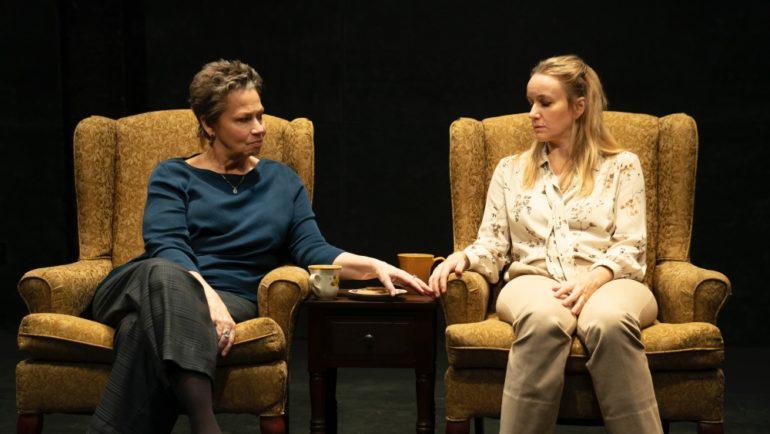‘The Thin Place’: Theater Review
By Marilyn Stasio
LOS ANGELES (Variety.com) – I can’t resist: “The Thin Place” is a thin play. But before it drifts away into the eternal empyrean, this slender drama by Lucas Hnath (“A Doll’s House, Part 2,” “Hillary and Clinton”) tells a beguiling ghost story. Well, not exactly a ghost story, but the story of a beguiling haunting that may or may not exist entirely in the imagination of the storyteller. If only he’d finished it.
In director Les Waters’ tightly wrapped production at Playwrights Horizons, suspense is all that really matters. The all-important storyteller is introduced when Mark Barton’s gothic lights come up on an introspective woman named Hilda. As played with a lovely ethereal quality by Emily Cass McDonnell, Hilda sets the otherworldly tone of the play. Settling herself on Mimi Lien’s remorselessly empty set, she takes a seat in one of two wingback chairs, flanking a table barely large enough to hold a teacup. Without much ado, she begins an intimate chat about herself. McDonnell has a beautiful voice, soft and mellow, so soothing it feels downright hypnotic.
We learn that Hilda dearly loved her grandmother, who had coached her in a mind-melding exercise so that they might continue to communicate after her death. “She’d be able to send words to me from beyond the grave,” says Hilda, who has been considering the means of establishing such a connection. Would she hear her grandmother’s voice in her head? Would she pick up the phone and find her grandmother on the line?
Enter Linda. As played by the dependably endearing Randy Danson, Linda seems as down-to-earth as Hilda appears wraithlike. So it seems funny when the plainspoken Linda reveals herself to be a psychic, “a real professional psychic” who can communicate with the dearly departed. “Now let’s get one thing straight,” she says briskly. “When you die, you merely pass on to something else.”
Entranced, Hilda wonders if there is some other place outside this world where the living and the dead can reconnect, or at least communicate. Can Linda reach this other place, “this place where the line between this world and some other world is very thin”?
You bet she can, and it’s a hoot to hear Danson’s big-hearted but uncouth delivery (rendered, for some reason, in low-class British vernacular) during a solemn séance. Linda is even funnier when she launches into her own life story. Hilda is transfixed and so are we. Even when Linda deliberately breaks the mood — “You do realize, don’t you, that what I do is sort of a trick, right?” — Hilda stubbornly clings to her faith in Linda’s psychic powers.
The problem is, nothing comes from this connection between Hilda and Linda, not even when other (superfluous) characters make an appearance to (unsuccessfully) liven things up. Even a jolly party to celebrate Linda’s brand-new American citizenship feels like nothing more than a device for treading narrative water.
Hnath has written two interesting characters with colorful backstories, and it’s a pleasure to hear his smart thoughts articulated in supple language. But he has cavalierly dispensed with all the usual theatrical conventions, like a cohesive dramatic structure or even a conventional narrative arc. And nothing is more infuriating than when one of his characters can’t even remember the end of a gripping ghost story.

